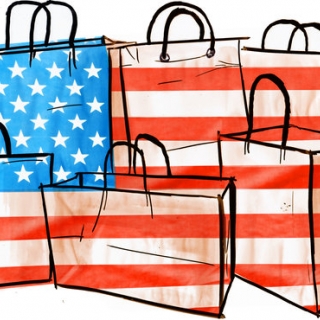


The U.S. has signaled it will not let up on its Aug. 1 deadline for higher tariffs on the European Union as the bloc fights to strike a deal in time.
Over the weekend, U.S. Commerce Secretary Howard Lutnick said he was confident a trade deal could be struck with the European Union, but warned that the deadline for a baseline 30% tariff is fixed.
"That's a hard deadline, so on August 1, the new tariff rates will come in," Lutnick said Sunday on CBS News when asked about the deadline for his EU tariffs.
He did signal that talks could continue after this date, however, noting: "These are the two biggest trading partners in the world, talking to each other. We'll get a deal done. I am confident we'll get a deal done."
"Nothing stops countries from talking to us after August 1, but they're going to start paying the tariffs on August 1," he added.
The EU has said it is preparing retaliatory measures against the U.S. if punitive trade tariffs are imposed. Lutnick dismissed the possibility of the EU targeting items like Boeing airplanes and Kentucky bourbon, however, saying, "they're just not going to do that."
Last-ditch talks to reach a trade agreement are ongoing, with the EU hoping it can negotiate a lower tariff rate. The bloc had hoped it could strike a similar pact to the U.K., which was the first country to make a trade agreement with the U.S. That deal includes a 10% baseline tariff with some caveats relating to car, steel and aerospace imports.
But economists and analysts have become increasingly skeptical about Brussels' ability to agree on a similar framework.
For one, the EU has a much trickier relationship with U.S. President Donald Trump than the U.K. does. Trump has frequently bemoaned what he sees as an imbalanced trade relationship and unfair trading practices, which the EU denies.
According to the European Council, total trade between the EU and U.S. amounted to 1.68 trillion euros ($1.96 trillion) in 2024. While the EU ran a trade surplus in goods, it recorded a deficit in services. Overall, the bloc had a surplus of around 50 billion euros last year, when both goods and services are taken into account.
Last Friday, the Financial Times reported that Trump was pushing for a minimum tariff of 15% to 20% on EU imports in any deal with the bloc. The president was also reportedly happy to keep duties on the auto sector at 25%, a move that would hurt car exporters in Germany particularly hard.
Speaking to CNBC's "Europe Early Edition" on Monday, Arnaud Girod, head of economics and cross-asset strategy at Kepler Cheuvreux, said a rate of 15% to 20% "would be a total car crash for European exports."
"On top of that, you add the euro strength that we've had ... so that would start to cost and to be very painful for European exports, and, of course, would also potentially, you know, reignite some fears on the inflation front in the U.S.," he added.
Source: CNBC
Indonesia's chief economic minister Airlangga Hartarto said Monday that a 19% tariff on Indonesian goods entering the United States could be implemented earlier than the August 1 deadline set by U.S. ...
Former U.S. President Donald Trump threatened to impose tariffs on members of the BRICS group of nations on Friday, warning the alliance would quickly collapse if it ever becomes a significant economi...
Federal Reserve Governor Chris Waller, an advocate for an immediate interest rate cut, said on Friday he would accept the job as head of the U.S. central bank if asked by President Donald Trump, but s...
The case for a U.S. interest rate cut remains unresolved as Federal Reserve officials head into their policy meeting later this month, with data showing fresh signs of higher inflation and President D...
Federal Reserve Governor Christopher Waller said concerns about private-sector hiring have fueled his call for the central bank to cut interest rates this month. "The private sector is not performing ...
Oil nudged lower following its first weekly drop this month, with traders focused on US tariff talks and the European Union's efforts to curb Russian energy exports. West Texas Intermediate crude fell 1% to trade below $67 a barrel,...
Gold (XAU/USD) is benefiting from renewed trade tensions on Monday, which have triggered demand for the safe-haven yellow metal. As the August 1 tariff deadline looms, prospects of a deal between the European Union (EU) and the United States (US)...
U.S. stocks moved higher on Monday as investors tracked the latest developments in trade and awaited the start of big tech earnings this week. The S&P 500 rose 0.4%, and the Nasdaq Composite jumped 0.7%. Both indexes had hit new all-time...
 Federal Reserve Governor Chris Waller, an advocate for an immediate interest rate cut, said on Friday he would accept the job as head of the U.S....
Federal Reserve Governor Chris Waller, an advocate for an immediate interest rate cut, said on Friday he would accept the job as head of the U.S....
 The case for a U.S. interest rate cut remains unresolved as Federal Reserve officials head into their policy meeting later this month, with data...
The case for a U.S. interest rate cut remains unresolved as Federal Reserve officials head into their policy meeting later this month, with data...
 The S&P 500 briefly touched an all-time high before hovering flat in the afternoon session, while the Nasdaq dipped 0.2% as investors weighed...
The S&P 500 briefly touched an all-time high before hovering flat in the afternoon session, while the Nasdaq dipped 0.2% as investors weighed...
 Stocks in the US closed near the flatline on Friday as investors weighed President Trump's push for higher tariffs on the European Union against...
Stocks in the US closed near the flatline on Friday as investors weighed President Trump's push for higher tariffs on the European Union against...